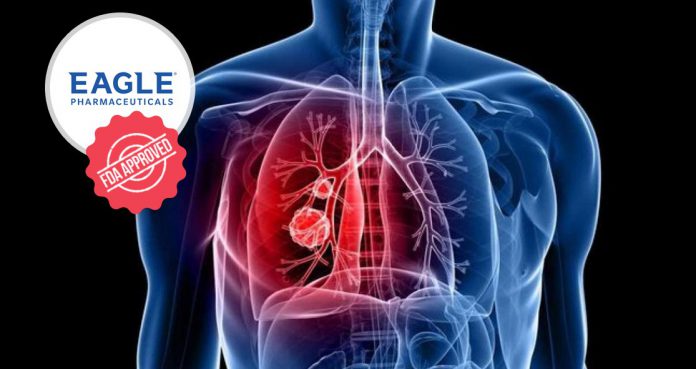The U.S. Food and Drug Administration (FDA) has announced the approval of Eagle Pharmaceuticals’ Pemfexy (pemetrexed), which is indicated for advanced cases of non-small cell lung cancer (NSCLC).
Pemfexy is a branded alternative to Alimta, which is developed by Eli Lilly and Co.
In December 2019, Eagle and Eli Lilly reached a settlement, allowing the FDA to shift the approval from tentative to final. The settlement allowed the limited entry of Pemfexy into the market in February 2022. In 2018, the FDA gave tentative approval for Pemfexy but the holdup was over patent issues.
Pemfexy contains pemetrexed that is injected for locally advanced or metastatic nonsquamous NSCLC, along with cisplatin, a chemotherapy medication.
CEO of Eagle Pharmaceuticals, Scott Tarriff, said, “We are pleased to receive final approval from FDA and look forward to making Pemfexy available to the patients who can benefit. Our initial market exclusivity for Pemfexy represents a significant opportunity for Eagle and builds on the successes of our expanding presence in the oncology space.”
In January, Eagle teamed up with the University of Pennsylvania to develop dantrolene sodium for Alzheimer’s disease. In July 2019, Penn researchers presented proof-of-concept preclinical work in a mouse model, which showed that intranasal dosing of dantrolene had therapeutic effects on cognition and memory.
At the time, Tarriff said, “Our collaboration with the University of Pennsylvania builds on Eagle’s strategy to develop and commercialize therapies for critical care and disorders that have significant unmet patient needs, such as Alzheimer’s disease, the most common form of dementia.”
“Dantrolene sodium’s potential for use in treating Alzheimer’s patients represents novel thinking backed by years of proprietary Eagle research,” he added. “Preclinical work around this has proven positive thus far and builds on Eagle’s years of insight gained in multiple clinical and preclinical studies on dantrolene sodium.”
Eagle also announced that it has resubmitted its New Drug Application (NDA) for Ryanodex (dantrolene sodium) for exertional heat stroke (EHS) and body cooling.
EHS is a severe type of heat-related illness, which is marked by a core body temperate of 104 F or greater. It can cause significant neurological issues, such as seizures, sudden behavioral changes, or even coma.
Ryandexis advised for the treatment of malignant hyperthermia along with supportive measures. It is also advised to prevent malignant hyperthermia in patients who are at high risk.





















